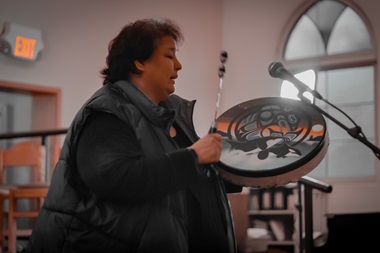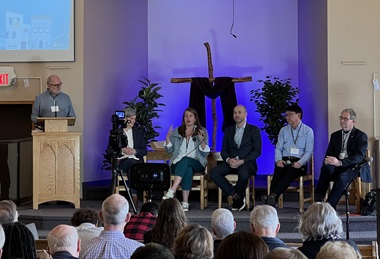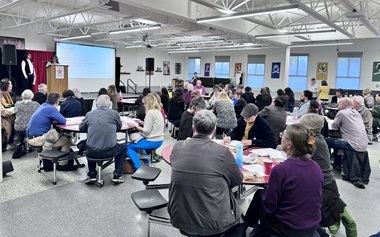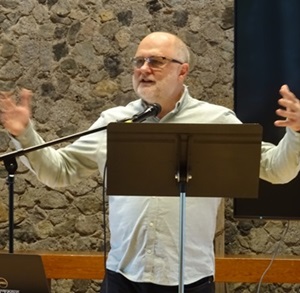
Melaney Gleeson-Lyall welcomed 160 participants to ‘Reimagining Church, Land & Community’ in March on behalf of the Musqueam Nation. Photo: John Carr
On a February Saturday morning this past year, more than 85 people gathered to explore how their churches could provide more housing for refugee claimants.
In March, over 160 people gathered to share ideas for how they could develop their church land and property for affordable housing and community benefit.
These are just two examples of the kinds of collaborative effort churches and church-based agencies are engaging in to bring about transformation for good in our city.
For four years, I have been leading CityGate Vancouver. My role has been to help build networks of churches – as well as agencies, community groups and individuals – to address some of the more vexing problems facing our city.
These problems are well-known, including, for example, the lack of affordable housing, schoolchildren living in poverty and social isolation among too many in our city.
What’s intriguing is that the sort of work CityGate is doing in Vancouver to build these collaborative networks among churches with each other and the rest of their city is emerging in more than 25 cities from Vancouver to Halifax.
Collaborative impact

Last year, CityReach volunteers gave away the equivalent of more than $3 million dollars worth of food, often partnering with local schools. CityReach is part of the Serve Our Schools network linking Christian ministries.
Why is this happening? Many people are coming to recognize that we will not have much impact in affecting such issues unless we work together. Indeed, the more you personally get to know those who are searching desperately for housing, or escaping from oppression in their home country or looking hungrily at your school lunch, the more you realize that these problems run deep and require systemic responses.
They call for more than just acts of charity; they demand that we work collaboratively for mercy and justice.
A second reason churches are working together more comes from theological motivation. Many followers of Jesus are more aware both of God’s vision to seek justice and peace among and for the least.
Add in Jesus’ clear call for the unity of his followers, and the realty that there are fewer divisions among denominations, and you begin to see why this motivation to work together for the flourishing of our cities is springing up across the country.
Expanding involvement

An expert panel at the ‘Reimagining Church, Land & Community’ event, hosted by Tim Dickau, featured, from left, Lisa Helps (BC Builds), Christine Boyle (Vancouver City Councilor), Nicholas Lai (long-time Surrey City planner) David Ley (Urban Geographer), and Michael Guenter (Vice President of Development at Concert Properties). Photo: Amanda Mina
Let me tell you one other intriguing feature I am noticing in these collaborations. More and more people beyond churches are joining in these efforts of churches and Christian based agencies.
- A man not connected to any church took part in the recent gathering about the affordable housing crisis facing refugee claimants. His family runs a construction company; they wanted to help – and recognized that churches were home to the sort of people who offer tangible aid.
- I think of two people who came to the church I formerly pastored. They got involved because our church – in partnership with others – was serving the neighbourhood in practical and transformative ways. One told me that they weren’t into the God thing but wanted to be a part of our efforts. The other said he’d been involved in other groups calling for justice but noticed that church-related groups sought to combine justice and love – as opposed to his too common experience of combining justice with hate.
- Then there is the Metro Vancouver Alliance, a network composed of churches, Jewish communities, labour unions and community groups – all working together to address the concerns of their members. They are currently seeking to secure coop housing units on sites that are coming up for the lease renewals in Vancouver.
Invitation to all

Metro Vancouver Alliance gathers churches, Jewish communities, labour unions and community groups. Photo: Amanda Mina
I want to invite those of you who are not part of churches or who are not connected to Christian faith to join in these collective efforts. We’d love for you to help and to bring your gifts!
Churches, working together, have experience in working on these issues and can be places to learn from others’ expertise and wisdom within a supportive community structure.
Over the years, I have been approached by people who see this opportunity to join in a church’s efforts but are cautious because, as they would say, “I’m not sure I really believe all this.”
Well, join the club. Many people following Jesus are continually asking new questions about their faith. While not all churches have been safe places to ask questions in the past, many now are making more room for these questions. What’s more, the best way to learn about this way of Jesus is to join in the efforts of those who are trying to live out his vision of caring for the least and loving our neighbours.
Over 50 years ago, philosopher and social theorist Jurgen Habermas (in his book The Structural Transformation of the Public Sphere) identified how the space between individuals and the State/Market – which he used the existing term “civil society” to describe – was being increasingly vacated.
In his analysis, there were fewer and fewer groups like churches, other faith communities, unions and community groups who were organizing and working on the ground to mediate between individuals and the State/Market and to bring healing to neighbourhoods.
With the increase of forces such as autonomy and social isolation and consumerism, it is no surprise that this space of the civil society has continued to weaken.
It seems to me that churches are poised to enter this space of civil society. Motivated by both a desire to seek the peace and well-being of our cities as well as a call to work collectively, in unity, churches have a huge opportunity to enter and partially fill up this void.

Tim Dickau leading ‘Reimagining Home’ at Epiphany Chapel last fall.
I long to see more churches enter this space individually and collectively, and I long for those of you who have not been involved in churches to join in these collective efforts.
If you want to get involved in one of these issues, contact me – or a church or agency in your neighbourhood which is already working to address them. In a society where we often feel powerless, joining others who are working for good on the ground is very empowering!
Let’s work together for this divine vision of justice and peace in Vancouver. The opportunity to step into this open space is right in front of us!
Tim Dickau is Director of CityGate Vancouver and can be contacted at tim@citygatevancouver.org.
